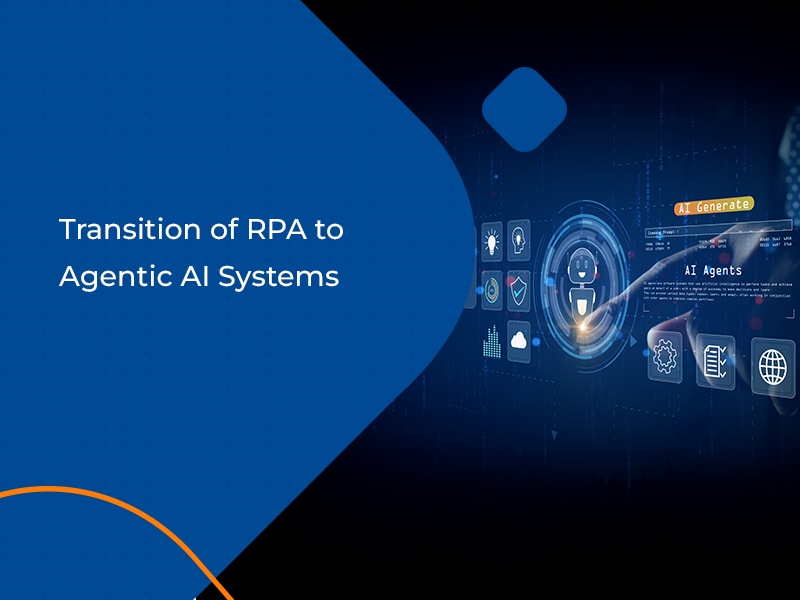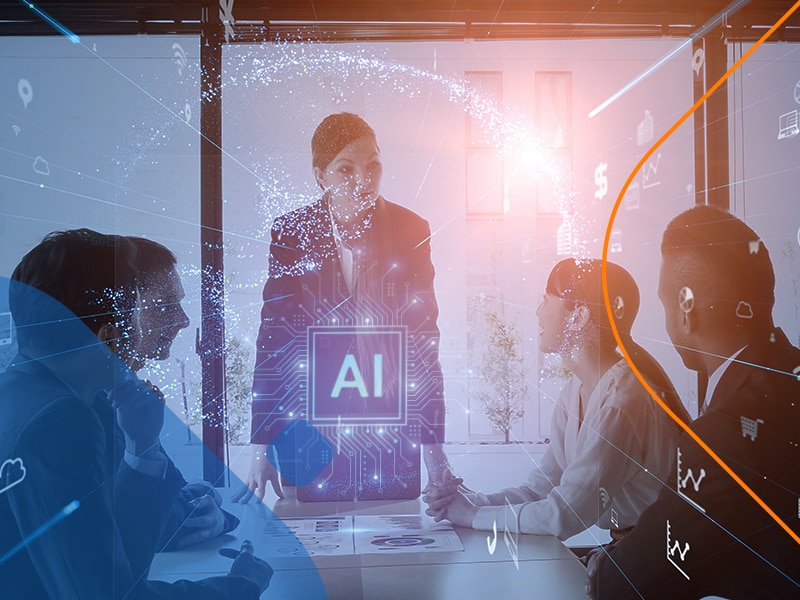Home > Blogs > The Rise of AI Agents: Transforming Enterprises and Shaping the Future
The Rise of AI Agents: Transforming Enterprises and Shaping the Future

Table of Contents
The Rise of AI Agents
* Podcast is AI Generated Content
“We are at a pivotal moment where the true potential of AI is reaching an inflection point. This is the turning point where AI will finally deliver on the promises we’ve anticipated for years. In the future, our interactions will predominantly be with these AI agent”
– Swaminathan Natarajan,
Engineering Head, EdgeVerve AI Next
What are AI Agents and Why They Matter?
Generative AI has entered a transformative phase, marked by the emergence of AI agents. AI agents are LLM-powered computer programs that can perceive their environment, make decisions, and take actions to achieve specific goals. They are designed to operate autonomously, meaning they can function without constant human intervention. This advancement marks a crucial shift from basic automation to comprehensive problem-solving capabilities. AI agents now function as collaborative partners, working alongside humans to solve complex problems.
The evolution from conventional AI assistants to autonomous agents represents a fundamental reimagining of human-machine interaction. While early chatbots could only respond to queries, today’s agentic systems can understand context, maintain ongoing dialogues, and take action across multiple steps to achieve specific goals. Essentially, this integration of reasoning capabilities, logical processing, and the ability to access external information – all connected to a Generative AI model- represents the concept of an agent, or a program that goes beyond the standalone capabilities of a Generative AI model. This leap forward has opened new possibilities for how organizations can leverage AI technology.
The transformation is already reshaping the business landscape– real-world adoption rates tell a compelling story: approximately 51% of companies have already deployed AI agents in production environments, with mid-sized organizations (100-2,000 employees) leading the charge at 63%[1]. The momentum is building rapidly, as 78% of organizations are actively developing agents for future deployment[1].
Characteristics of AI Agents
Behind the widespread hype around AI agents lie distinct characteristics that make them particularly powerful for enterprise applications. AI agents have characteristics that define their ability to operate intelligently and autonomously within an environment.
Understanding the AI Agent Framework
These characteristics are implemented through a structured framework that enables AI agents to function cohesively. The below image represents a potential structure of an LLM-based agent (just one of many possible configurations).
It consists of three core components: the brain, perception, and action.
In essence, an AI agent extends beyond the basic question-answering capabilities of a traditional LLM. It processes feedback, retains memory, plans future actions, and collaborates with various tools to make informed decisions.
Benefits of AI Agents
With these foundational capabilities in mind, agentic AI offers a range of transformative benefits that can drive substantial improvements across various business functions:
AI Agents at Work: Industry Applications
Let’s explore some scenarios that illustrate how AI agents could enhance business operations across different industries.
Retail Industry Use Case
Another use case involves a B2B logistics scenario where goods need to be transported between locations. Currently, customers contact logistics providers, and these providers need to carry out an extensive verification process. This includes checking equipment availability, vehicle requirements, expertise needed at both loading and unloading points, etc. The process involves numerous back-and-forth communications with customer service for clarifications and corrections. AI agents can streamline this entire process. When a sufficient amount of good quality internal data is readily available, these agents can automatically perform necessary checks and route decisions to appropriate stakeholders in alignment with shipment requirements. This significantly reduces the time and complexity involved in logistics planning.
Beyond these examples, AI agents can be applied across any business offering, providing the ability to scale operations without additional human resources. Human employees remain the most valuable assets in an organization, particularly considering their cost and domain expertise. By automating routine tasks and supporting decision-making, AI agents help businesses optimize their existing resources while driving growth and innovation.
Challenges
AI agents offer significant benefits, but organizations must address key challenges when deploying them. Data privacy concerns require ensuring robust security measures due to the large volumes of data involved. Ethical challenges, such as potential bias or inaccuracy in AI models, necessitate guardrails. Additionally, the technical complexities of implementing AI agents demand specialized expertise, and the intensive computational requirements for training and deployment can lead to high infrastructure costs. These factors must be carefully considered to ensure successful AI agent integration.
Conclusion
As AI agents continue to evolve, they’re reshaping how businesses operate, make decisions, and interact with customers. While challenges around data privacy and ethical considerations remain, the potential benefits of increased efficiency, improved decision-making, and scalable operations make AI agents a compelling solution for forward-thinking organizations.
Seize the Opportunity: Elevate your enterprise with AI platforms such as EdgeVerve AI Next, featuring advanced agentic capabilities. The platform empowers businesses to deploy intelligent AI agents that turn complex challenges into strategic advantages for sustainable growth.



Sathish Kumar EV
Director - Product Management, EdgeVerve
More blogs from Sathish Kumar >